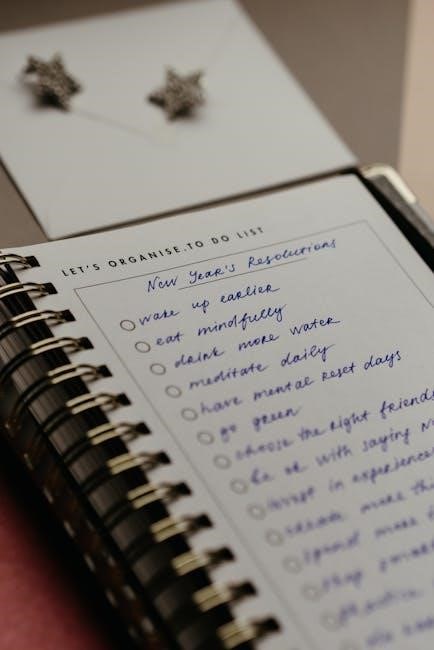Problem-solving skills are essential for 3rd graders, enhancing mathematical thinking and real-life adaptability. Free PDF resources offer interactive exercises, fostering creativity and critical thinking in young learners.
Importance of Problem Solving Skills
Problem-solving skills are crucial for 3rd graders as they build a strong foundation for mathematical reasoning and logical thinking. These skills enable students to approach challenges methodically, fostering creativity and critical thinking. By practicing problem-solving, children develop persistence and confidence in overcoming obstacles. Such abilities not only enhance academic performance but also prepare students for real-life situations. Access to free PDF resources and interactive exercises simplifies learning, making it engaging and effective. Cultivating these skills early ensures a lifelong capability to tackle complex tasks with ease and accuracy, promoting overall cognitive development.
Benefits for Students in 3rd Grade
Problem-solving skills in 3rd grade offer numerous benefits, enhancing students’ ability to think critically and approach challenges confidently. These skills improve mathematical reasoning, logical thinking, and creativity, preparing students for more complex tasks. By engaging with problem-solving activities, students develop persistence and a growth mindset, essential for overcoming obstacles. Free PDF resources and interactive exercises make learning accessible and engaging, allowing students to practice at their own pace. Additionally, problem-solving fosters collaboration and communication, as students often work in groups to share ideas and solutions. This skill set not only boosts academic performance but also equips students with tools for real-world decision-making, making it a vital part of their educational journey.

Key Concepts and Skills
Key problem-solving concepts for 3rd graders include numerical reasoning, logical thinking, and creativity. These skills foster critical thinking, structured approaches, and step-by-step problem resolution methods, enhancing math proficiency effectively.
Numerical and Logical Reasoning
Numerical and logical reasoning are foundational skills for problem-solving in 3rd grade. These skills involve understanding relationships between numbers, patterns, and logical sequences. Students learn to approach problems methodically, using strategies like counting, basic algebra, and mental math. Logical reasoning helps students make sense of mathematical operations, such as addition, subtraction, and multiplication, by breaking them down into manageable steps. For example, solving problems like dividing candies equally or calculating the time taken to complete tasks requires both numerical accuracy and logical thinking. Free PDF resources provide exercises that focus on these skills, ensuring students develop a strong mathematical foundation. These exercises often include word problems, interactive activities, and step-by-step solutions to enhance understanding and confidence.
Vocabulary Building for Problem Solving
Vocabulary building is a crucial aspect of problem-solving skills in 3rd grade. Students need to understand mathematical terms and concepts to interpret and solve problems effectively. Free PDF resources provide exercises designed to enhance vocabulary, ensuring students grasp key terms related to operations, shapes, and logical reasoning. These exercises often include word problems, where students must decipher the language to identify the mathematical operation required; For example, terms like “double,” “triple,” and “sequence” are emphasized to help students translate words into numerical actions. By strengthening their vocabulary, students become more confident in approaching and solving a variety of mathematical challenges. Interactive activities and detailed corrections further support their learning journey, making complex problems more accessible;

Types of Problems
Types of problems include enumeration, logic, construction, and table-based exercises. These categories help students develop a structured approach to mathematical thinking and problem-solving skills.
Enumeration Problems
Enumeration problems involve counting and organizing objects or elements in a logical sequence. These exercises help students develop systematic thinking and basic arithmetic skills. By solving such problems, learners practice listing items, identifying patterns, and understanding quantities. Enumeration challenges often include tasks like counting animals in a picture or arranging objects by size. These activities enhance mathematical reasoning and attention to detail. Free PDF resources offer interactive enumeration exercises, making learning engaging and fun for 3rd graders. Through these problems, students build a strong foundation in numerical reasoning and problem-solving strategies, essential for more complex math concepts in higher grades.
Logic Problems
Logic problems are designed to enhance critical thinking and reasoning skills in 3rd graders. These exercises often involve puzzles, riddles, or sequential reasoning tasks. Students learn to break down problems into smaller parts and use deductive thinking to find solutions. Logic problems help improve concentration and analytical abilities, preparing learners for more complex challenges. Free PDF resources provide a variety of logic-based exercises, such as identifying patterns or solving simple brain teasers. Detailed corrections and explanations are included to guide students and help them understand their mistakes. These activities make learning engaging and fun while fostering essential problem-solving skills for future academic success.
Construction Problems

Construction problems encourage students to build or recreate shapes, numbers, or objects using various materials. These hands-on activities help develop spatial awareness and creativity. For example, learners might assemble geometric figures with blocks or draw diagrams to represent mathematical concepts. Construction problems also enhance fine motor skills and logical thinking. Free PDF resources offer worksheets with step-by-step guides, allowing students to practice independently. Detailed corrections provide feedback, helping them refine their techniques. These exercises are particularly effective for visual learners, as they transform abstract ideas into tangible creations. By engaging in construction problems, 3rd graders develop a deeper understanding of mathematical relationships and improve their problem-solving abilities in a fun and interactive way.

Table-Based Problems
Table-based problems involve organizing and analyzing data presented in tables to solve mathematical tasks. These problems help students understand relationships between different pieces of information. For example, learners might fill in missing numbers, identify patterns, or calculate totals using the data provided. Tables are particularly useful for visual learners, as they simplify complex information. Free PDF resources offer a variety of table-based exercises, such as completing tables, solving word problems, or creating charts. Detailed corrections guide students in identifying errors and improving their problem-solving strategies. These activities enhance logical reasoning, data interpretation, and mathematical accuracy. By practicing with tables, 3rd graders develop essential skills in organizing and interpreting information, which are valuable for real-world applications.

Strategies for Effective Problem Solving
Effective problem-solving strategies include systematic approaches and critical thinking exercises. These methods help students break down problems, identify patterns, and find logical solutions, enhancing their mathematical reasoning skills.
Systematic Approach to Problem Solving
A systematic approach to problem solving involves breaking down complex tasks into manageable steps. This method encourages students to understand the problem, plan a solution, and execute it methodically. By using strategies like factorisation, equations, and logical reasoning, learners can identify patterns and relationships. Free PDF resources provide structured exercises that guide students through this process, ensuring they verify each step before finalizing their answers. This approach not only enhances mathematical accuracy but also fosters critical thinking and confidence. Teachers can use these tools to create engaging lessons, helping students develop a clear and organized way to tackle challenges. Regular practice with systematic methods prepares young learners for more advanced problem-solving scenarios in the future.
Critical Thinking Exercises
Critical thinking exercises are designed to engage students in deeper analytical processes. These activities encourage learners to question, analyze, and evaluate information systematically. Through problem-solving scenarios, such as solving riddles or logic puzzles, students develop the ability to break down complex tasks into simpler steps. Interactive exercises, like identifying patterns or completing sequences, further enhance their reasoning skills. Word problems and real-life situations prompt students to think creatively and apply mathematical concepts effectively. Regular practice with these exercises fosters independence and builds confidence in tackling challenges. Free PDF resources provide a variety of these exercises, ensuring students stay engaged and motivated to improve their critical thinking abilities.

Free PDF Resources and Worksheets

Free PDF resources and worksheets are readily available for 3rd-grade problem-solving. These materials offer interactive exercises and detailed corrections, helping students improve their mathematical skills effectively.
Accessing Free PDF Worksheets
Accessing free PDF worksheets for 3rd-grade problem-solving is straightforward. Many educational websites offer downloadable resources, such as math exercises, word problems, and logic puzzles. These worksheets are designed to enhance critical thinking and mathematical reasoning skills. They often include interactive exercises and detailed corrections to help students learn from their mistakes. Parents and teachers can easily print or share these materials, making them convenient for home or classroom use. The PDF format ensures compatibility across devices, allowing students to practice problem-solving anywhere. Additionally, these resources are organized by topics, such as enumeration, logic, and construction problems, catering to diverse learning needs. With a focus on engagement and effectiveness, free PDF worksheets are a valuable tool for young learners.
Utilizing Detailed Corrections for Learning

Detailed corrections in free PDF worksheets are a powerful tool for 3rd-grade problem-solving. These corrections provide step-by-step explanations, helping students understand their mistakes and grasp the correct solutions. By reviewing these corrections, learners can identify patterns in their errors and improve their problem-solving strategies. Many resources include answers with visual aids, such as highlighted steps or diagrams, making complex concepts clearer. This feature is especially beneficial for visual learners and those who need additional support. Regularly reviewing corrections fosters a deeper understanding of mathematical concepts and logical reasoning. Over time, students become more confident in their abilities, as they learn to apply these insights to new problems. Detailed corrections are an essential part of the learning process, guiding students toward mastery.

Example Problems and Solutions
Engaging word problems and logic puzzles help 3rd graders apply skills. Interactive exercises include step-by-step solutions, fostering understanding and confidence in mathematical reasoning and problem-solving strategies.
Word Problems in Context
Word problems in context help 3rd graders connect math to real-life scenarios, enhancing understanding and application. For example, Omar sharing caramels or Louis completing homework quickly illustrates practical math use. These problems, often found in free PDF resources, include step-by-step solutions and interactive exercises. They encourage critical thinking and logical reasoning. Detailed corrections in these materials guide students to identify mistakes and improve. Engaging scenarios make learning fun and relatable, fostering a strong foundation in problem-solving skills. Such exercises are designed to align with curriculum goals, ensuring comprehensive skill development through meaningful practice.
Interactive Exercises for Engagement
Interactive exercises are a dynamic way to engage 3rd graders in problem-solving activities. Free PDF resources often include games, puzzles, and real-world scenarios, such as the cowboy solving a cattle problem or a farmer managing his herd. These exercises encourage students to think creatively and logically. They also promote collaboration, as students can work in pairs or groups to find solutions. Interactive elements like drag-and-drop activities or fill-in-the-blank tasks make learning fun and immersive. Detailed corrections and step-by-step solutions help students understand their mistakes and improve. These exercises align with curriculum goals, ensuring students develop problem-solving skills while staying motivated and excited about learning math.
Free PDF resources for 3rd-grade problem-solving foster mathematical skills and critical thinking, providing engaging exercises and detailed corrections to support students’ learning journey effectively.
Problem-solving in 3rd grade focuses on developing critical thinking and mathematical skills through interactive exercises. Free PDF resources provide a variety of engaging activities, such as enumeration, logic, and construction problems, designed to enhance creativity and adaptability. Detailed corrections and step-by-step solutions help students identify errors and improve their understanding. These resources also include table-based problems and word problems in context, making learning comprehensive and fun. Strategic approaches, like systematic reasoning and critical thinking exercises, empower young learners to tackle challenges confidently. By practicing with these materials, students build a strong foundation for advanced problem-solving in mathematics and real-life situations.
Encouragement for Further Practice
Encourage students to continue practicing problem-solving skills using free PDF resources, which offer a wide range of engaging exercises. These materials are designed to make learning enjoyable and effective, helping students build confidence in their mathematical abilities. Regular practice with enumeration, logic, and construction problems fosters creativity and logical thinking. Parents and educators can support learners by providing feedback and celebrating progress. By embracing these activities, students will not only master problem-solving but also develop essential skills for future academic success. Make practice a routine part of learning, using interactive exercises and real-world applications to keep students motivated and eager to explore new challenges.
